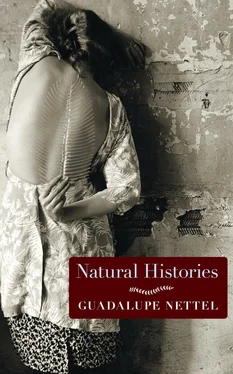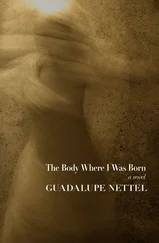Guadalupe Nettel
Natural Histories: Stories
to Ale Oru and Pelo Pegado
All animals know what it is they need, except for man.
— Pliny the Elder
Man belongs to an animal species that when injured can become particularly ferocious.
— Gao Xingjian
The Marriage of the Red Fish
Our last red fish, Oblomov, died yesterday afternoon. I had a feeling he was going to, having barely seen him move in his round fishbowl for some days. He didn’t leap either as he used to for food or to chase the rays of sunlight that brightened his habitat. It was like he was a victim of depression, or its equivalent in the life of a fish in captivity. I came to know very few things about this animal. Very few times I peered through the glass of his bowl and looked him in the eyes and when I did, it wasn’t for very long. It pained me to see him there, alone, in his glass container. I very much doubt he was happy. That’s what most saddened me when I saw him yesterday, floating like a poppy petal on the surface of a pond. He, on the other hand, had more time, more serenity to spend watching Vincent and me. I am sure that in his way he too felt sorry for us. You tend to learn a lot from the animals you live with, even fish. They are like mirrors that reflect the buried emotions and behaviors we don’t dare see.
Oblomov was not the first fish we had in the house, but the third. Before him there were two others of the same color, which I did observe, and which became a fascinating object of study for me. They came one Saturday morning, two months before Lila was born. Pauline, a mutual friend, brought them to us in the same container in which their successor was to die. Vincent and I were very happy to accept the gift. A cat or dog would have been a third wheel in our relationship and a nuisance in our apartment, but we liked the idea of sharing our home with another couple. Plus we had heard that red fish bring luck and in those days we were seeking any kind of talisman, be it animal or object, to temper our anxiety about the pregnancy.
We first placed the fish on a small corner table in the living room where the afternoon sun fell. We thought they cheered up the room, which faced the patio behind our building, with the quick movements of their fins and tails. I don’t know how many hours I must have spent watching them. A month earlier I had requested maternity leave from the law office where I worked to prepare for the birth of my daughter. It wouldn’t be forever, and it wasn’t uncommon, but still it troubled me. I didn’t know what to do at home. The too-many empty hours filled me with questions about my future. Winter was at its worst and just the thought of getting dressed to face the icy wind was enough to dissuade me from going out for a walk. I preferred to stay home, reading the newspaper or getting things ready for Lila’s arrival, turning the tiny study into a bedroom for her. On the other hand Vincent was spending more time in the office than ever. He wanted to make the most of these last few months to get ahead on his projects before the baby was born. Reasonable enough, but I missed him, even when we were together. He felt distant, lost in his busy schedule and in his professional worries where there was no place for me. Often, waiting for him to come home from work, I sat and watched the fishes’ sometimes slow and measured, sometimes frantic or terrorized comings and goings. I learned to tell them apart, not just by the nearly imperceptible differences in the colors of their scales, but by their behavior and the way they moved, searched for food. There was nothing else in the fishbowl. No stone, no cavity in which to hide. The fish always saw each other, and every act by one, every rising to the surface and circling of the glass, inevitably affected the other. Hence the impression of dialogue watching them gave me.
Unlike Oblomov, those fish never had names. We referred to them as the male and the female. Despite their strong resemblance it was possible to distinguish them by the robust build of the former and because his scales shined brighter than his companion’s. Vincent watched them much less, but they inspired a curiosity in him as well. I’d tell him of the things I thought I’d discovered about them and he enjoyed hearing about the happenings in the lives of the extended family staying with us. I remember one morning, while I was at the kitchen counter making coffee, he pointed out to me that one of them — possibly the male — had opened its fins and they now looked bigger, as if doubled, and full of colors.
“And the female?” I asked, coffeepot in hand. “Is she prettier too?”
“No. She’s still the same, but she’s barely moving,” Vincent said, his face pressed to the glass of the fishbowl. “Maybe he’s courting her.”
That day we went to the outdoor market on Boulevard Richard-Lenoir. A favorite weekend activity of ours. The snow had disappeared and instead of the eternal rain we could feel the sun’s presence in the sky. We enjoyed ourselves shopping, but the morning didn’t end on the same note. We were ready to head home, loaded down with bags of food, when I got the urge to ask if we could buy oranges and Vincent refused so sharply it felt like an insult.
“They’re so expensive this time of year,” he argued untruthfully. “We can’t afford it. It’s like you have no sense of the expenses we’ll have once the baby is born. You can’t go on squandering money like always.”
Maybe it was the hormones. Pregnant woman often get upset over nothing. But what’s certain is that in less than five minutes it felt like dark and menacing clouds had engulfed my life. All men cater to their pregnant wives’ wishes, I thought. Some people believe these inexplicable cravings in fact reflect the baby’s nutritional needs. What was wrong with Vincent? How could he just refuse like that to buy a few simple oranges? I tried to make it home without getting caught up in an argument. But after a few steps I had to sit down on a bench to rest. My coat didn’t close around me anymore and a sweater that to me seemed old and hideous was poking out from its black edge. I felt my eyes fill with tears. Vincent noticed as well but he wasn’t about to let it go.
“You’re impossible to please,” he said. “We came to the market so you’d be happy and you get like this over something stupid. Unbelievable.”
It took a lot of restraint not to get up and go buy the oranges with my own money, but my happiness did not return the entire weekend. When we got home the male of the fishbowl still had his gills erect. His seductive behavior seemed arrogant to me. The female swam with drooping fins and her movements, listless compared to his, made me sad.
On Monday I left the house early. I sat down in the brasserie on the corner and ordered a tall orange juice. I also had a café crème and a croissant and paid with our joint credit card. Afterward I went to a bookstore and bought a novel, then spent an hour trying on clothes in the store on rue des Pyrénées that carries large sizes and found the perfect sweater to replace mine. I went back home midday, just before lunchtime. Once inside, I went directly to the living room and peered into the fishbowl, as if consulting an oracle: the male still had his fins unfolded but now his companion also exhibited a physical change. All along her body two dull brown horizontal lines had appeared. I cooked pasta with eggplant and ate it standing up, looking out the kitchen window at two workers doing repairs on the facing building. I then diligently washed the dirty pot and utensils. Afterward I went out for a walk through the neighborhood and ended up at the library. I felt a pull to go in, but it closed early on Mondays so I went back home and read my novel while waiting for Vincent. When he came in I showed him the lines on the female’s body, which had me a little scared. But to him they looked insignificant.
Читать дальше












